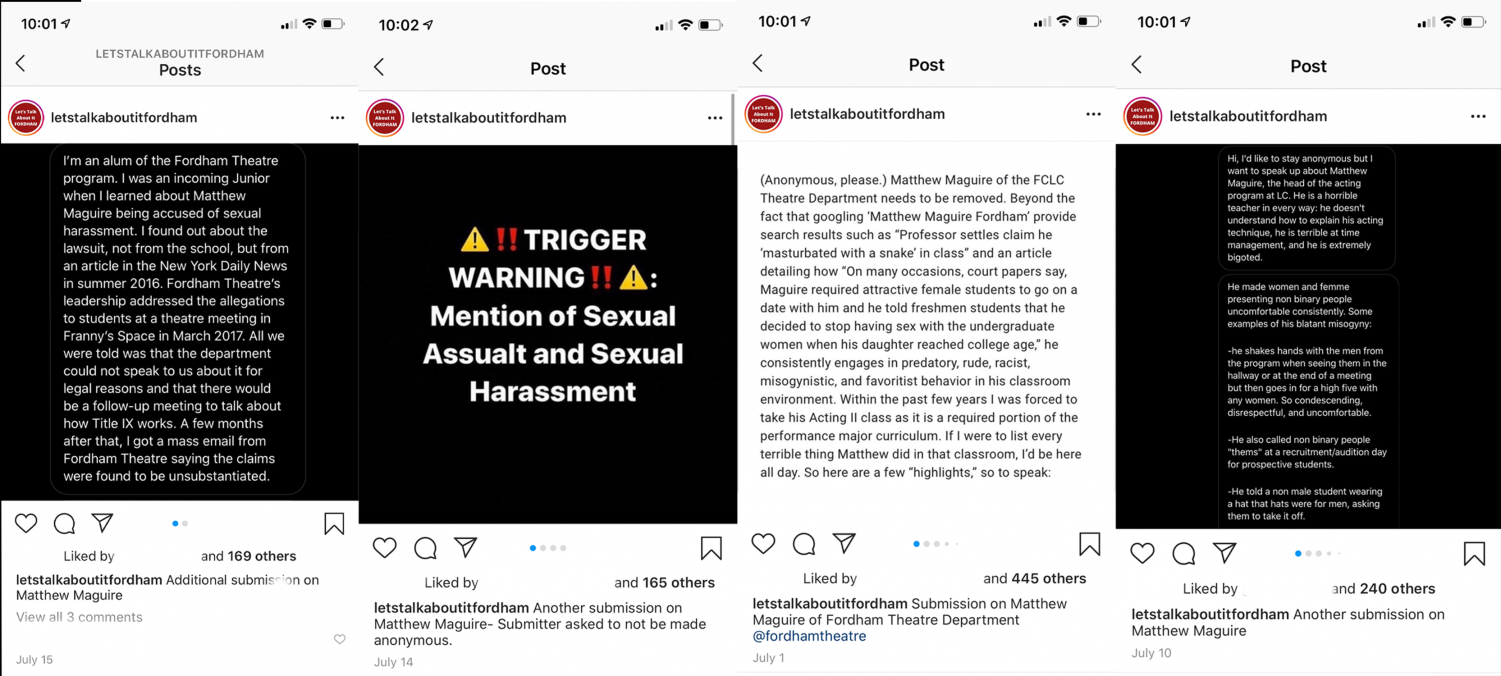Two Instagram accounts, @letstalkaboutitfordham and @blackatfordham, emerged in June as platforms for students, faculty and alumni to anonymously share their experiences of prejudice at Fordham. The accounts appeared in the wake of George Floyd’s murder and the largest civil rights movement in recent American history amplifying voices of people speaking out against discrimination, racism and microaggressions.
Currently, there are 5 posts on @letstalkaboutitfordham and 4 posts on @blackatfordham alleging situations of misconduct against Prof. Matthew Maguire and the theatre department at Fordham. While this article focuses on allegations against the theatre department and a member of its staff, The Observer plans to publish a series of articles that revolve around the key issues surfacing as more students speak out.
Allegations of Misogyny
In 2014, assistant professor Kris Stone’s contract was not renewed by the theatre department after she filed several complaints about Maguire, the current chair of the acting program. According to the court papers filed in a 2016 lawsuit against Maguire and Fordham University, Maguire’s behavior made Stone “extremely uncomfortable and she reached a point where she dreaded encountering him and even coming to work. Ms. Stone came to view the Theatre Department as an unpleasant and intimidating workplace.”
Maguire’s alleged behavior was expanded to include “using the beginning of department meetings to discuss his sexual exploits, pushing attractive female students to go on dates and requiring other students to perform acts of rape, masturbation and molestation in class.” In one case, Stone claims in the court papers, “student of both Ms. Stone’s and Mr. Maguire’s came to Ms. Stone’s office crying because she was terrified by Mr. Maguire’s insistence that she participate as a victim in a rape scene on stage.”
The court papers also read that Stone reported Maguire’s actions to Elizabeth Margid, chair of the theatre department at the time, but no concrete action was taken. Margid did not respond to The Observer’s request for comment.
The lawsuit resulted in a $20,000 settlement, according to reporting in the New York Post. However, Stone was barred from teaching at Fordham and was prohibited from speaking about the case. Bob Howe, assistant vice president for communications, released a statement in 2016; “Ms. Stone made these deliberately provocative allegations only after she was denied reappointment. The University hired an independent investigator who concluded there was no merit to the allegations.”
One anonymous submitter on @letstalkaboutitfordham was a student in the theatre department when the lawsuit was proceeding. They wrote, “I found out about the lawsuit, not from the school, but from the New York Daily News in summer 2016.” They claimed that Fordham Theatre leadership briefly addressed the allegations to students in March 2017, but no additional information was discussed and no conversation was had.
“Anytime I would speak in class, he would cut me off almost without fail to the point where other students would notice it.” Amara McNeil, FCLC ’23
This is not the only post on the accounts about Maguire — to date, there have been 5 posts made about him on @letstalkaboutitfordham out of their 376 total and 4 on @blackatfordham out of 196. Similar allegations to the ones Stone made against Maguire have been posted — only this time the allegations are coming from current students and alumni.
The numerous allegations below detail that Maguire has allegedly permitted an environment of toxicity, sexism and racism throughout the department. These allegations comprise 9 Instagram posts and 14 testimonies collected by a group of theatre students.
When asked about these allegations, Maguire told The Observer, “I am reviewing all of these materials and looking forward to working with the entire community to achieve real change at Fordham.”
In an interview with The Observer, Amara McNeil, FCLC ’23, who is a Black woman, said that Maguire repeatedly ignored her.
“Anytime I would speak in class, he would cut me off almost without fail to the point where other students would notice it,” McNeil said. “He would criticize anything I said. And I noticed that he wasn’t doing that with other students, especially white male students. It got to the point where I didn’t even talk in class.”
Jayla Pollock, FCLC ’22, said, “He would never answer questions when they were raised by women. But if a guy asked the question, even if it wasn’t their scene, he would answer it.”
Another student, who spoke to The Observer anonymously to avoid future conflicts with Maguire or the theatre program, also experienced a similar situation when she went to a meeting with him required to get an A in his class. The meeting was proceeding normally until he “closed the door, put his hand on my leg and said ‘can I ask you a personal question?’ Not knowing what to do, I just said yes and then he goes on to obsess over my height … I made an excuse and left as soon as possible.”
Evan Sibley, Fordham College at Lincoln Center (FCLC) ’16, submitted one post stating, “I have seen Mr. Maguire make inappropriate sexual comments to other students that have made them feel uncomfortable and unsafe.”
Maguire has also been accused of perpetuating a harmful environment for his Black, Indigenous, and People of Color (BIPOC) students.
Creating a Space of Discomfort for BIPOC Students
McNeil said she was asked to do a piece on police brutality without any advanced notice. As a Black student, she found this to be uncomfortable. “Keep in mind, this is a class with 44 students, and maybe four of them are Black. I expressed my discomfort with doing the piece and I asked if I could opt out of doing it. Matthew seemed to be very confused as to why I wanted that and didn’t really respect my decision.”
“It wasn’t until I started to have conversations with some of the Black upperclassmen students that they were like, yeah, this is a normal thing. And I was able to discuss my experiences with them and they were able to empathize with it because they had similar experiences.”
Maguire was director of the theatre department until 2019, when his role changed to the head of the acting track and a professor. According to a 2019 Observer interview with Maguire, the decision to step down was his own as he felt that he was at the peak of his career as theatre director. During his tenure, however, students raised multiple concerns with him about plays that were produced.
“Matthew seemed to be very confused as to why I wanted [to opt out] and didn’t really respect my decision.” Amara McNeil, FCLC ’23
In fall 2015, Maguire decided to put on a mainstage adaptation of “The Orphan of Zhao,” which is a 14th century Chinese play. The production had four Asian actors and six white actors. An alum of the theatre department, who asked to be anonymous out of fear of a negative career impact, FCLC ’16, recalled that the play “involved yellowface. The theatre program has always been conscious of its student body lacking diversity, and it was a conscious choice to produce a play that called for a cast of color which could not be fulfilled with our casting pool of student actors,” they said.
In a letter addressing the concerns of yellowface at the time, Maguire wrote, “We cannot wait until we have a sufficient pool of the ‘correct’ ethnicity to decide to produce a play, because if we wait, then those actors and designers and stage managers will not come to Fordham.”
Although Maguire affirmed in his letter that yellowface was unacceptable, the same concerns arose in 2019. The play “Sound of a Voice” by David Henry Hwang was written with two Japanese leads and slated to be a part of the 2019 studio season. The show cast a white person as the male lead. A week before the premiere, the department discovered the show was legally prohibited from being put on unless there were two actors of Asian descent in the main roles. The show was shut down and only shown to theatre students after the finding.
Claire Talbott, FCLC ’21, who identifies as Chinese and white, was a lighting designer on the show. When she asked about the casting decision, she said she was told “it was just about him being right for the part. I said, well did you look for an Asian man to audition for the part? We only had one Asian male acting student at the time. We want to do diverse plays. But we don’t want to whitewash.”
“They attribute everything to us as our race and not on our talent. I would like to see that addressed. I would like to see the faculty take more accountability for their microaggressions as well.” David Wilson, FCLC ’21
In Maguire’s acting classes — which every Fordham directing and acting student is required to take — he had previously assigned the students to perform “A Raisin in the Sun,” a play by Lorraine Hansberry that featured a predominantly Black cast.
As a Black student, David Wilson, FCLC ’21, said, “There was an issue of how are we going to connect to this text and be able to give a truthful story if only two of these students (in the class) are Black actors, and he kept disregarding that and sticking to his reasoning for it and it just didn’t feel like there was much listening on his end. I had a difficult time doing my scene with a white actor playing my Black mother.”
A Ripple Effect
Talbott further said, “Seeing a role model, a person in power, who can consistently get away with making women feel uncomfortable or making people of color feel uncomfortable, because he’s just trying to do his job has definitely bled into the student body,” she said. “I’ve heard white students complaining that if we do shows with a diverse cast, they don’t get a part.”
Wilson agreed and stated that he has heard white students attributing BIPOC students getting roles to their race rather than their talent. “It’s made it very difficult because I know for me personally, I have had to work very hard on every show. It makes it harder for us because we don’t get to focus on our craft for the sake of focusing on the craft; we focus on it to prove ourselves now.”
A group of students are collecting testimonies from current and former students of Maguire — they currently have 14. They are calling for the removal of Maguire as the first step to rectify these issues. McNeil specified that she would like to see anti-bias training for both students and faculty, and more concrete emotional and financial support for BIPOC students at Fordham.
“Seeing a role model, a person in power, who can consistently get away with making women feel uncomfortable or making people of color feel uncomfortable, because he’s just trying to do his job has definitely bled into the student body.” Claire Talbott, FCLC ’21
Wilson clarified that the issues facing the Fordham theatre department are not isolated and apply to the campus as a whole. “There are so many times that students openly speak against students of color and say that they are lucky to be in this program. They attribute everything to us as our race and not on our talent. I would like to see that addressed. I would like to see the faculty take more accountability for their microaggressions as well.”
McNeil connected the allegations against Maguire to the larger issue of Fordham University not holding its faculty accountable. She said, “There have been many instances in which we’ll report one faculty member to another and they will either not take you seriously or talk you out of saying something or just say no.”
While allegations against Maguire have surfaced recently on @letstalkaboutitfordham, they’ve been raised since at least 2014 when Stone first voiced her concerns.
The anonymous alum from 2016 believes Maguire’s power over those in the theatre department is part of the problem. “Matthew could impact your time at Fordham and therefore your career, which scared some students from speaking up.”
McNeil pointed out that this was not a unique feature of the theatre department. In the end, she says, “The issue of Matthew McGuire is a limb off of the larger issue of Fordham University.”
Joe Kottke contributed additional reporting to this story.



